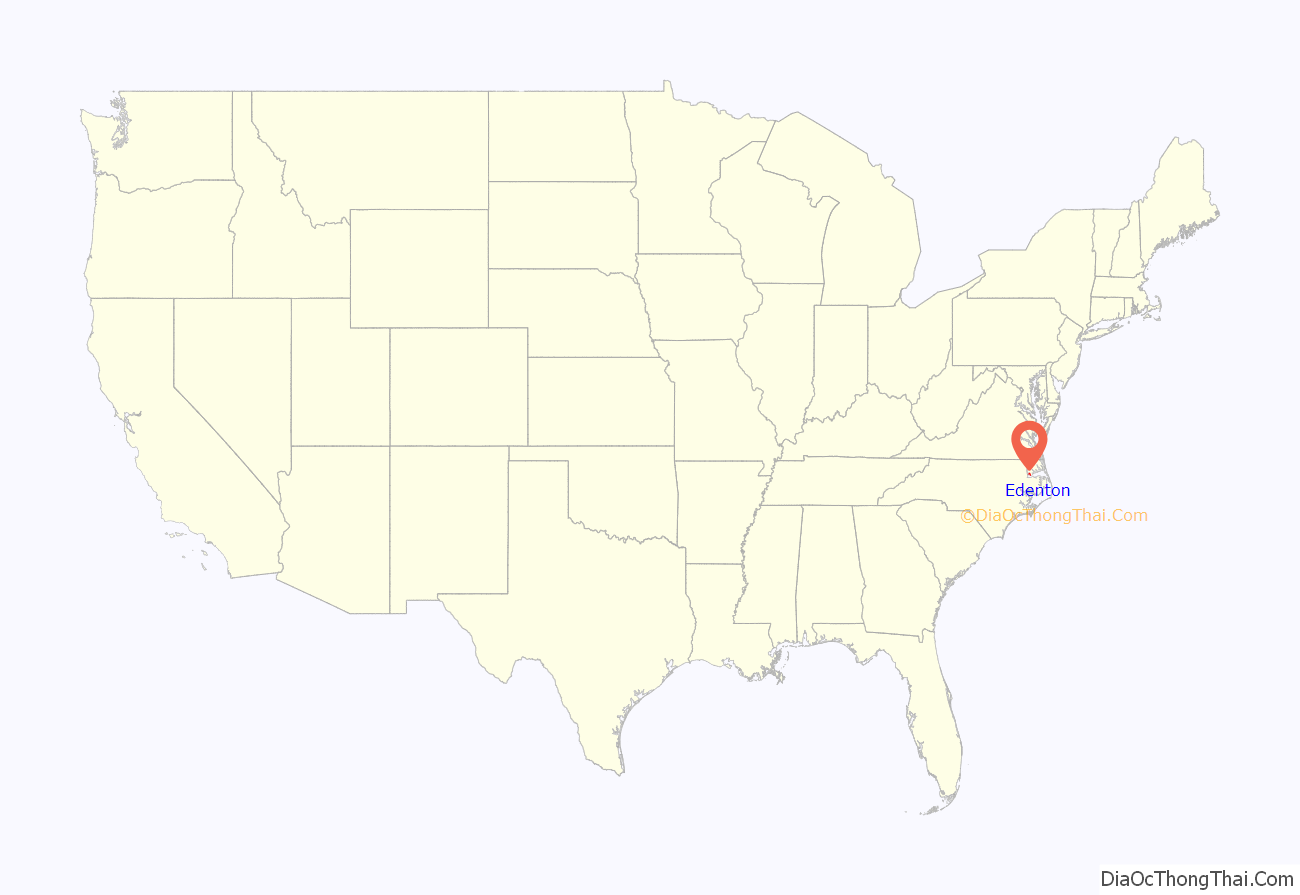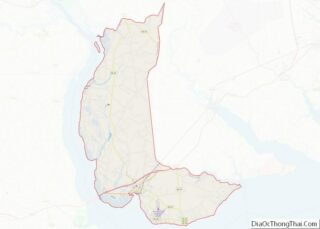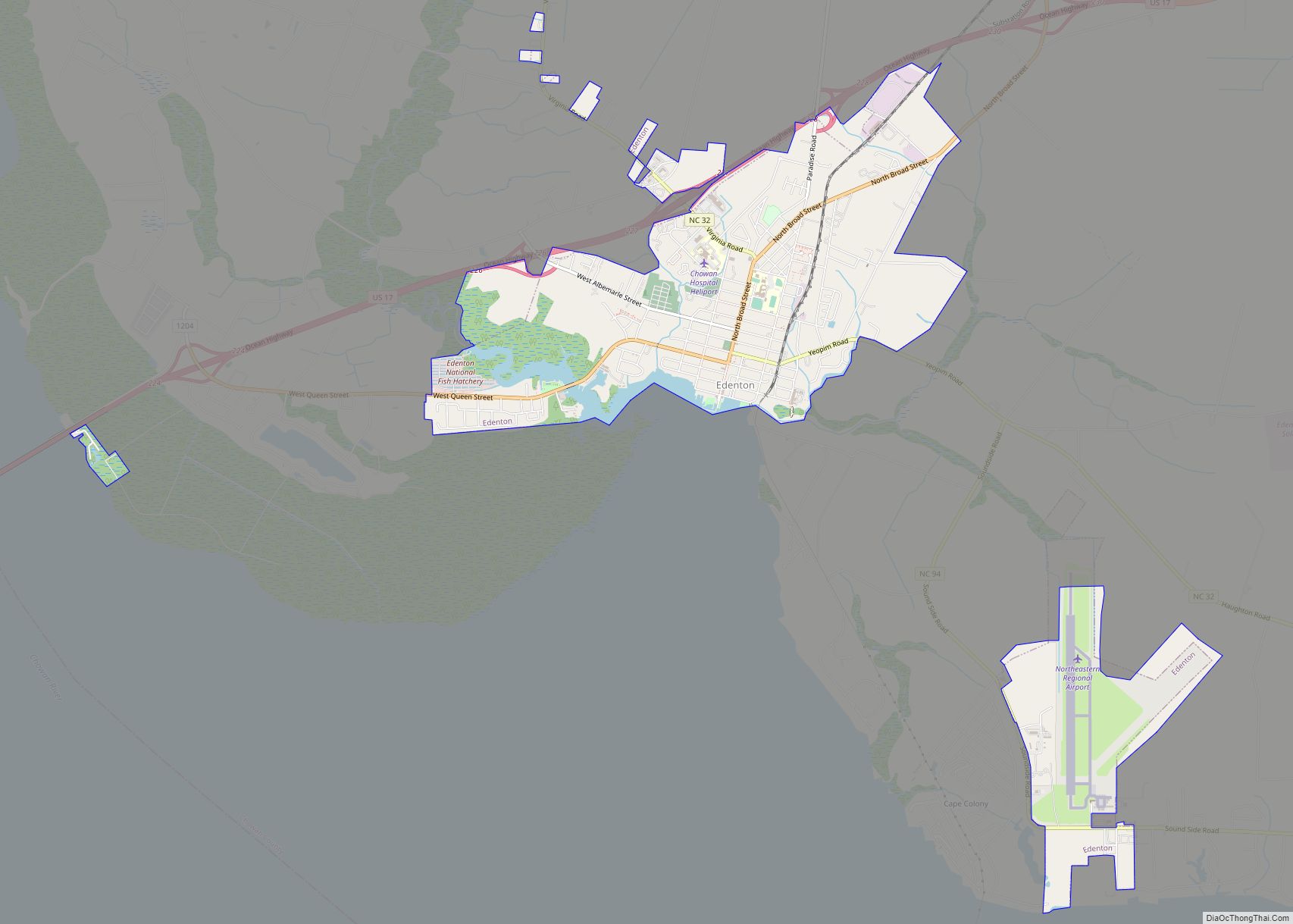Edenton is a town in, and the county seat of, Chowan County, North Carolina, United States, on Albemarle Sound. The population was 4,397 at the 2020 census. Edenton is located in North Carolina’s Inner Banks region. In recent years Edenton has become a popular retirement location and a destination for heritage tourism.
Edenton served as the second official capital of North Carolina, during the colonial era as the Province of North Carolina, though other than housing the governor’s official residence, it did not otherwise house any other governmental functions. It served as capital from 1722 to 1743, when it was moved to Brunswick. The town was the site of the Edenton Tea Party, a protest organized by several Edenton women in 1774 in solidarity with the organizers of the Boston Tea Party. It was the birthplace of Harriet Jacobs, an enslaved African American whose 1861 autobiography, Incidents in the Life of a Slave Girl, is now considered an American classic. Edenton gained notoriety for a famous wrongful conviction during the Satanic panic era of the late twentieth century. Today, Edenton’s local economy is primarily driven by tourism, and as a popular retirement location.
| Name: | Edenton town |
|---|---|
| LSAD Code: | 43 |
| LSAD Description: | town (suffix) |
| State: | North Carolina |
| County: | Chowan County |
| Incorporated: | 1722 |
| Elevation: | 13 ft (4 m) |
| Total Area: | 5.57 sq mi (14.43 km²) |
| Land Area: | 5.38 sq mi (13.92 km²) |
| Water Area: | 0.20 sq mi (0.51 km²) |
| Total Population: | 4,460 |
| Population Density: | 829.77/sq mi (320.40/km²) |
| ZIP code: | 27932 |
| Area code: | 252 |
| FIPS code: | 3720120 |
| GNISfeature ID: | 1025302 |
| Website: | www.townofedenton.com |
Online Interactive Map
Click on ![]() to view map in "full screen" mode.
to view map in "full screen" mode.
Edenton location map. Where is Edenton town?
History
Edenton Colony
In 1658 adventurers from the Jamestown area drifted through the wilderness from Virginia and found a location on the northern shore of a small natural harbor at 36°02′42″N 76°36′54″W / 36.045°N 76.615°W / 36.045; -76.615, now called Edenton Bay. Edenton Colony was the first permanent European settlement in what is now the state of North Carolina.
Edenton was established in 1712 as “the Towne on Queen Anne’s Creek”. It was later known as “Ye Towne on Mattercommack Creek” and still later as “the Port of Roanoke”. It was renamed “Edenton” and incorporated in 1722 in honor of Governor Charles Eden, who had died that year.
Historic Edenton
Edenton served as the second capital of the Province of North Carolina, from 1722 to 1743, with the governor establishing his residence there and the population increasing during that period.
William Byrd II, who visited the town in March 1729, provides a description of Edenton in his The History of the Dividing Line:
A landmark in women’s history occurred in Edenton in 1774. Fifty-one women in Edenton, led by Penelope Barker, signed a protest petition agreeing to boycott English tea and other products, in what became known, decades later, as the Edenton Tea Party. The Edenton Tea Party is the first known political action by women in the British American colonies. In fact it so shocked London that newspapers published etchings depicting the women as uncontrollable. Her home, the Barker House, is open seven days a week, without a fee, and is considered by many as Edenton’s living room.
Joseph Hewes, a resident of Edenton and successful owner of a merchant marine fleet, was appointed the first Secretary of the Navy in 1776. John Adams said that Hewes “laid the foundation, the cornerstone of the American Navy.” Hewes also signed the United States Declaration of Independence.
James Iredell, also of Edenton, was at 38 the youngest member of the first United States Supreme Court. He was appointed by George Washington. His son James Iredell Jr., served as the Democratic-Republican governor of North Carolina and then became a United States senator. His home may be toured through the Historic Edenton Visitors Center.
Easy sea access halted with a 1795 hurricane which silted Roanoke Inlet. Completion of the 1805 Dismal Swamp Canal took business elsewhere by diverting shipping to Norfolk, Virginia. Locals rejected construction of a railroad, a lack that impeded the local economy.
Supreme Court Justice James Wilson, a signer of both the Declaration of Independence and the United States Constitution, died in Edenton on August 21, 1798, at age 55, while riding his judicial circuit.
Harriet Jacobs and her brother John were born into slavery in Edenton in 1813 and 1815, respectively. They, and later Harriet’s children, were baptized at St.Paul’s. Their early childhood was centered around Horniblow’s tavern, the town’s only colonial hotel, on the northern side of East King Street, just west of Chowan County Courthouse. Twelve-year old John Jacobs was sold at public auction in 1828, probably at Market House (junction Water Street / Broad Street). Both siblings became enslaved to an abusive master, the local physician, Dr. James Norcom, living with him at his house on West Eden Street. In 1835, Harriet Jacobs went into hiding in the house of her grandmother, a freedwoman, on the northern side of West King Street, a few steps from Broad Street. She famously had to stay there concealed in a crawl space for seven years before she was finally able to escape to New York, where she wrote Incidents in the Life of a Slave Girl, now considered an “American classic”.
In 1862, during the Civil War, the Albemarle Artillery was recruited at Edenton by a local attorney named William Badham Jr. Its guns were cast from bronze bells taken from courthouse and churches in the Edenton area. Known as the Edenton Bell Battery, its four howitzers were named the Columbia, St. Paul, Fannie Roulac, and Edenton. Two of the guns, the St. Paul and Edenton, have been returned to Edenton and can now be seen at Edenton’s waterfront park.
Edenton enjoyed an economic revival beginning in 1890 led by lumbering, an 1898 cotton mill, and a 1909 peanut-processing plant.
Edenton is the home of the 1886 Roanoke River Lighthouse. The lighthouse is called a screw-pile design because of its original support system. Each piling was literally screwed into the river or sound bottom so they would not pull out in heavy storms and hurricanes. The Roanoke River Lighthouse, now located at Edenton, is believed to be the last extant example in the United States of a rectangular frame building built for a screw-pile base. The lighthouse was in commission from 1887 until 1941.
Edenton is home to numerous early houses and public buildings, including the Cupola House. It was designated a National Historic Landmark in 1970, a designation also accorded the 1776 Chowan County Courthouse. The courthouse is still used for official court events. The city is home to the oldest house still in existence in North Carolina, constructed in 1719 before the establishment of the city.
Edenton achieved international notoriety for the Little Rascals Day Care sexual abuse case, the subject of journalist Ofra Bikel’s award-winning trilogy of documentaries: Innocence Lost (1991), Innocence Lost: The Verdict (1993), and Innocence Lost: The Plea (1997).
Edenton Road Map
Edenton city Satellite Map
Geography
Edenton is located in southern Chowan County at 36°03′39″N 76°36′30″W / 36.06083°N 76.60833°W / 36.06083; -76.60833 (36.0608, −76.6083). It sits at the north end of Edenton Bay, just north of the confluence of the Chowan and Roanoke rivers, which forms Albemarle Sound.
U.S. Route 17, a four-lane expressway, runs along the northern border of the town, with access from five exits. US 17 leads northeast 27 mi (43 km) to Elizabeth City and southwest 37 mi (60 km) to Williamston. Nags Head on the Outer Banks is 72 mi (116 km) to the east by road, and Raleigh, the state capital, is 136 mi (219 km) to the west.
According to the United States Census Bureau, Edenton has a total area of 5.6 sq mi (14.4 km), of which 5.4 sq mi (13.9 km) is land and 0.19 sq mi (0.5 km), or 3.55%, is water.
See also
Map of North Carolina State and its subdivision:- Alamance
- Alexander
- Alleghany
- Anson
- Ashe
- Avery
- Beaufort
- Bertie
- Bladen
- Brunswick
- Buncombe
- Burke
- Cabarrus
- Caldwell
- Camden
- Carteret
- Caswell
- Catawba
- Chatham
- Cherokee
- Chowan
- Clay
- Cleveland
- Columbus
- Craven
- Cumberland
- Currituck
- Dare
- Davidson
- Davie
- Duplin
- Durham
- Edgecombe
- Forsyth
- Franklin
- Gaston
- Gates
- Graham
- Granville
- Greene
- Guilford
- Halifax
- Harnett
- Haywood
- Henderson
- Hertford
- Hoke
- Hyde
- Iredell
- Jackson
- Johnston
- Jones
- Lee
- Lenoir
- Lincoln
- Macon
- Madison
- Martin
- McDowell
- Mecklenburg
- Mitchell
- Montgomery
- Moore
- Nash
- New Hanover
- Northampton
- Onslow
- Orange
- Pamlico
- Pasquotank
- Pender
- Perquimans
- Person
- Pitt
- Polk
- Randolph
- Richmond
- Robeson
- Rockingham
- Rowan
- Rutherford
- Sampson
- Scotland
- Stanly
- Stokes
- Surry
- Swain
- Transylvania
- Tyrrell
- Union
- Vance
- Wake
- Warren
- Washington
- Watauga
- Wayne
- Wilkes
- Wilson
- Yadkin
- Yancey
- Alabama
- Alaska
- Arizona
- Arkansas
- California
- Colorado
- Connecticut
- Delaware
- District of Columbia
- Florida
- Georgia
- Hawaii
- Idaho
- Illinois
- Indiana
- Iowa
- Kansas
- Kentucky
- Louisiana
- Maine
- Maryland
- Massachusetts
- Michigan
- Minnesota
- Mississippi
- Missouri
- Montana
- Nebraska
- Nevada
- New Hampshire
- New Jersey
- New Mexico
- New York
- North Carolina
- North Dakota
- Ohio
- Oklahoma
- Oregon
- Pennsylvania
- Rhode Island
- South Carolina
- South Dakota
- Tennessee
- Texas
- Utah
- Vermont
- Virginia
- Washington
- West Virginia
- Wisconsin
- Wyoming





